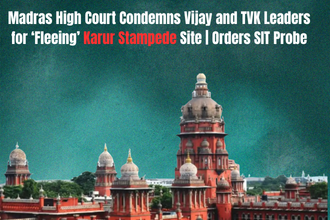The Supreme Court of India on September 19, 2025, refused to entertain an application filed by 85-year-old poet and activist P. Varavara Rao, seeking modification of the bail condition that restricts him from leaving Greater Mumbai without prior court permission. Rao, an accused under the Unlawful Activities (Prevention) Act, 1967 (UAPA) in the Bhima Koregaon case, had urged the Court to allow him to reside in Hyderabad due to deteriorating health and financial constraints.
A Bench of Justices JK Maheshwari and Vijay Bishnoi dismissed the plea as withdrawn after hearing submissions from Senior Advocate Anand Grover, who appeared on behalf of Rao.
Background of the Bhima Koregaon Case
The Bhima Koregaon case traces back to the events of January 1, 2018, when violence broke out during the commemoration of the 200th anniversary of the Battle of Bhima Koregaon in Maharashtra. The police alleged that provocative speeches at the Elgaar Parishad, organized a day before the event, instigated violence and had links to banned Maoist organizations.
Several activists, lawyers, and academics—including Sudha Bharadwaj, Gautam Navlakha, Anand Teltumbde, and Varavara Rao—were arrested and charged under the stringent provisions of the UAPA.
Rao, who was arrested in August 2018, spent over two and a half years in custody before being granted medical bail in August 2022 by a Supreme Court bench led by then CJI UU Lalit, Justice Aniruddha Bose, and Justice Sudhanshu Dhulia.
Rao’s Plea Before the Supreme Court
Senior Advocate Anand Grover argued that:
- Health concerns: Rao’s health is deteriorating due to old age. He recently fell from dizziness, highlighting his fragile condition.
- Lack of family support in Mumbai: Earlier, Rao’s wife was taking care of him, but she has since shifted to Hyderabad. Currently, there is no one to look after him in Mumbai.
- Financial difficulties: Although Rao receives a pension of ₹50,000 per month, he spends about ₹76,000 on medical expenses in Mumbai. By contrast, in Telangana, he can access free healthcare facilities.
Grover requested that Rao be allowed to reside in Hyderabad and also sought liberty for Rao to make a fresh application at a later stage.
Supreme Court’s Observations
The Bench was not convinced by the arguments and declined to modify the bail condition. Justice Maheshwari remarked:
“Government will take care of his health… otherwise go to the same Court, we are not interested.”
The Court refused to record Grover’s request for liberty to reapply later and dismissed the plea as withdrawn.
The Bail Order of 2022
The earlier order granting Rao bail was explicitly limited to medical grounds and not on the merits of the case. The Supreme Court had emphasized:
- Rao should not leave Greater Mumbai without the permission of the Special NIA Court.
- He must not misuse his liberty, influence witnesses, or interfere with the investigation.
- He should keep NIA informed of any medical treatment received.
- The bail was temporary and subject to strict conditions, given the seriousness of allegations under UAPA.
The recent plea sought relaxation of para 18(b)(i) of the bail order, which restricts Rao’s movement.
Stage of the Trial
Grover also submitted that proceedings are currently at the Section 207 CrPC stage (supply of documents to the accused) and that the trial is not likely to conclude soon. Despite this, the Supreme Court refused to relax bail conditions.
Legal Significance of the Order
The refusal to modify Rao’s bail condition reflects the judiciary’s cautious approach in UAPA cases, where allegations relate to terrorism and national security. Courts have historically been reluctant to dilute bail conditions under UAPA, citing the potential risks to investigation and witnesses.
The order highlights three key legal principles:
- Medical Bail is Exceptional: Bail on medical grounds is conditional and strictly monitored, especially under special laws like UAPA.
- Court’s Discretion in Bail Conditions: Modification of conditions depends on compelling reasons, and mere inconvenience or financial burden may not suffice.
- Balancing Liberty and National Security: While Rao’s age and health were considered earlier, the Court ensured that his liberty does not compromise the investigation.
Implications for Rao and Other Bhima Koregaon Accused
- For Rao: He continues to reside in Mumbai, incurring heavy medical expenses, unless the trial court grants permission to travel.
- For other accused: The order signals that the Supreme Court may not entertain relaxation pleas unless there are overwhelming medical or humanitarian grounds.
- For UAPA jurisprudence: The case reaffirms that courts tread cautiously in granting bail or altering bail conditions in matters involving allegations of terrorism or sedition.
Criticism and Human Rights Concerns
Civil rights activists argue that stringent bail conditions under UAPA violate the constitutional right to life and liberty under Article 21. They contend that:
- Elderly and infirm accused like Rao should not be subjected to restrictive conditions that aggravate their suffering.
- The delay in trials effectively amounts to punishment without conviction.
- The right to access affordable healthcare should be given priority, particularly for senior citizens.
On the other hand, the government and investigative agencies argue that bail relaxation could enable accused persons to influence witnesses or abscond, thereby derailing the trial.
Case Title
P. Varavara Rao and Anr. v. Union of India and Anr., MA 1675-1676/2025 in Crl.A. No. 1206/2022
Conclusion
The Supreme Court’s refusal to modify Varavara Rao’s bail condition in the Bhima Koregaon case underscores the judiciary’s reluctance to dilute restrictions in UAPA matters. While Rao’s age, deteriorating health, and financial difficulties evoke humanitarian sympathy, the Court has prioritized judicial caution and national security concerns over personal convenience.
This case once again brings into focus the tension between civil liberties and state security powers, especially under stringent anti-terror laws. The order signals that unless there are extraordinary circumstances, the Supreme Court is unlikely to interfere with conditions attached to medical bail in cases involving grave charges like those under the UAPA.
Also Read
Air India Crash 2025: NGO Moves Supreme Court Seeking Independent Probe, Disclosure of Flight Data


